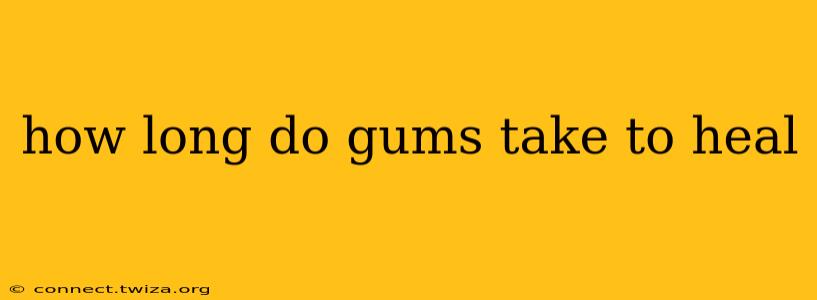Healing time for gum injuries and conditions varies significantly depending on several factors. There's no single answer to "how long do gums take to heal?", but understanding the influencing factors and the healing process itself will give you a better idea of what to expect. This guide will explore various gum injuries and conditions, their typical healing times, and what you can do to promote faster, healthier healing.
What Factors Affect Gum Healing Time?
Several factors influence how quickly your gums heal:
- Severity of the injury or condition: A minor gum abrasion will heal much faster than a severe gum infection or surgical procedure.
- Overall health: Individuals with underlying health conditions, such as diabetes or weakened immune systems, may experience slower healing times.
- Oral hygiene: Maintaining excellent oral hygiene is crucial for promoting gum healing. Poor oral hygiene can prolong the healing process and increase the risk of infection.
- Age: Older individuals may heal more slowly than younger individuals.
- Smoking: Smoking significantly impairs healing and increases the risk of complications.
- Medication: Certain medications can affect healing time.
How Long Does it Take for Different Gum Issues to Heal?
Minor Gum Abrasions or Cuts:
Minor injuries like small cuts or abrasions from brushing too aggressively usually heal within a few days to a week. Good oral hygiene, rinsing with salt water, and avoiding irritating foods are key to speeding up the process.
Gum Infection (Gingivitis):
Gingivitis, the early stage of gum disease, is characterized by inflammation and bleeding gums. With proper treatment—regular brushing, flossing, and professional cleaning—gingivitis can often resolve within a few weeks. However, if left untreated, it can progress to periodontitis.
Periodontitis:
Periodontitis, a more severe form of gum disease, involves damage to the supporting structures of the teeth. Healing from periodontitis depends on the severity and the treatment provided. This can range from several weeks to months or even longer, potentially requiring ongoing professional care and potentially periodontal surgery.
Gum Graft Surgery:
Gum graft surgery involves taking tissue from another area of the mouth (or a donor source) to cover exposed tooth roots or fill gum recession. Recovery from a gum graft typically takes several weeks, with complete healing potentially taking several months. Discomfort and swelling are common in the initial post-operative period.
After Tooth Extraction:
The healing process after a tooth extraction involves the formation of a blood clot and the gradual closure of the socket. This usually takes several weeks, with complete healing taking several months. During this time, it's crucial to follow your dentist's instructions carefully to avoid complications.
After Gum Surgery (Other Procedures):
The healing time for other gum surgeries, such as flap surgery or bone grafting, varies depending on the procedure's complexity. It can take several weeks to months for complete healing.
What Can I Do to Help My Gums Heal Faster?
- Maintain excellent oral hygiene: Brush and floss gently but thoroughly at least twice a day.
- Rinse with warm salt water: This can help soothe irritated gums and reduce inflammation.
- Avoid irritating foods: Stay away from spicy, acidic, or hard foods that could further irritate your gums.
- Quit smoking: Smoking significantly hinders healing and increases the risk of infection.
- Follow your dentist's instructions: Carefully follow any post-operative instructions provided by your dentist or periodontist.
- Maintain a healthy diet: A balanced diet rich in vitamins and minerals supports overall health and healing.
- Manage underlying health conditions: Controlling conditions like diabetes can significantly improve healing.
When Should I See a Dentist?
If you experience persistent gum pain, bleeding, swelling, or pus, you should see a dentist immediately. Early diagnosis and treatment are essential for preventing more serious complications. Don't hesitate to contact your dentist if you have any concerns about your gum health. They can provide a proper diagnosis and recommend the best course of treatment based on your individual needs.
Disclaimer: This information is intended for educational purposes only and does not constitute medical advice. Always consult with a qualified dental professional for diagnosis and treatment of any gum-related concerns.
